|
September 19, 2012 - No. 51
Continued Opposition to Putting
Students First Act
Actions
Across the Province Defend the Rights of All
   Protest at
Etobicoke-Lakeshore constituency office of Education Minister Laurel
Broten, September 14, 2012.
Protest at
Etobicoke-Lakeshore constituency office of Education Minister Laurel
Broten, September 14, 2012.
Continued
Opposition
to
Putting
Students
First
Act
• Actions
Across the Province Defend the Rights of All
• Students Enthusiastically Stand with
Teachers in Defence of Rights
Discussion on Putting
Students First Act
• Letter to the Editor
• McGuinty's Arrogance About Violating
Charter of Rights - Jim Nugent
In the Legislature
• Hands Off Public Sector Workers!
- Rob Woodhouse
• More McGuinty-Hudak Collusion to Attack
Public Sector Workers - Dan Cerri
An Injury to One is an
Injury to All! All for One and One for All!
• Migrant Farm Worker Killed in Belleville
Orchard
Take Back the Night!
• Toronto Women Hold Spirited Rally and March
Continued Opposition to Putting Students
First Act
Actions Across the
Province Defend the Rights of All
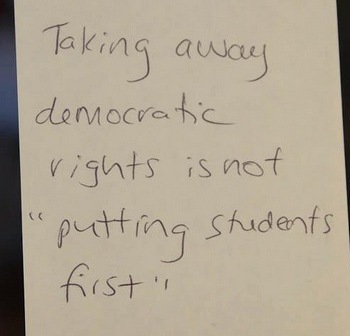  Protests at the offices
of MPP Lisa Thompson in Chesley and Jim Wilson in Collingwood.
Protests at the offices
of MPP Lisa Thompson in Chesley and Jim Wilson in Collingwood.Teachers and education workers are not backing down
after the passing of Bill 115, the Putting Students First Act.
On
September
14,
as
part
of
the
province-wide
actions
called by the
Ontario Secondary School Teachers' Federation (OSSTF), the Elementary
Teachers' Federation of Ontario (ETFO)
and the Canadian Union of Public Employees (CUPE) Ontario, teachers and
education workers across the province rallied outside of the
constituency offices of MPPs who voted to pass the bill. Students,
parents and others from the respective communities joined in the
rallies. Together they expressed their anger with
the passing of the bill in the legislature and the need to stand as one
to oppose dictate and the attack on
rights.
Rallies took place at many constituency offices
in towns
and cities throughout the province, including Chesley, London,
Mississauga, Brampton, Kingston, Sarnia, Pembroke and at Premier
McGuinty's office in Ottawa. Students at Woodbridge High School in
Vaughan showed their support for teachers by holding a rally the same
day.
 Rally at constituency
office of Premier Dalton McGuinty in Ottawa.
Rally at constituency
office of Premier Dalton McGuinty in Ottawa.
 Rally at constituency
office of MPP John Gerretsen in Kingston.
Rally at constituency
office of MPP John Gerretsen in Kingston.
 Rally at constituency
office of MPP John Yakabuski in Pembroke.
Rally at constituency
office of MPP John Yakabuski in Pembroke.
At Ontario Minister of Education Laurel Broten's office
in Etobicoke-Lakeshore, more than 250 people showed their contempt for
the bill.
Speakers pointed out that teachers and education workers are on the
front line of the attacks on public sector workers and that their fight
is not just for the public sector workers
but for all workers in both the public and the private sectors. When
one speaker asked "Who's next?" the crowd responded "Everybody!" One
speaker who fought the attacks of the Harris government said that she
has never seen such anti-democratic legislation as the Putting
Students First Act.
The attack
by the McGuinty government is ideologically motivated one speaker
noted, and
another pointed out that the rights of the teachers and education
workers are being trampled.

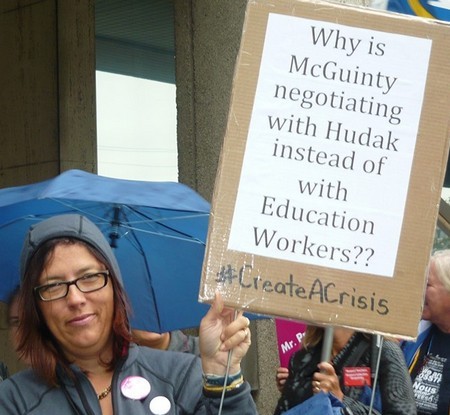  Etobicoke
Etobicoke
 
Mississauga rallies at
offices of MPPs Linda Jeffrey and Charles SousaIn Waterdown, near Hamilton, more than 100 teachers,
members of Local 1005
USW, firefighters, injured workers representatives and members of
the Hamilton and District Labour Council participated in a rally
at the office of Liberal MPP Ted McMeekin. The rally was
addressed by Lisa Hammond, President of the Hamilton Wentworth
Elementary Teachers Local (HWETL), Chantel Mancini, President of
OSSTF District 21, Archie Walker, President of CUPE Local, Rolf
Gerstenberger, President of Local 1005 USW and Anthony Marco, an
executive member of the Hamilton and District Labour Council.
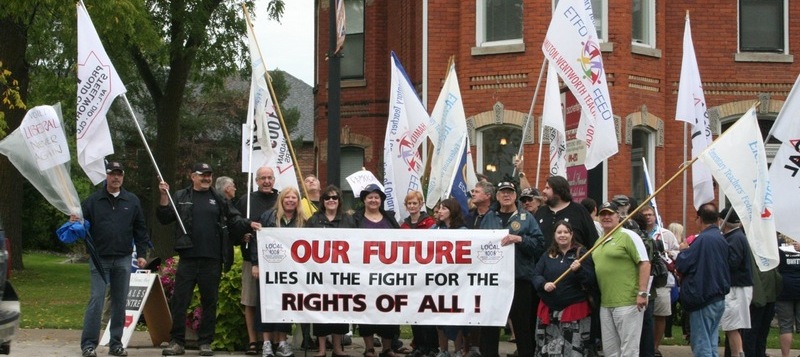 Waterdown
WaterdownAt Kitchener-Centre MPP John Milloy's office, people
shared their
concerns about the underhanded way that the McGuinty government dealt
with contract negotiations. In particular, they talked about their
concerns about the deterioration of the collective bargaining process
as
the government has totally denied teachers and education workers a
chance to
negotiate. They warned that the move against teachers and education
workers sets a precedent for attacks on other workers. The defeat of
the Liberals and the Progressive Conservatives in the recent
Kitchener-Waterloo by-election was described as a reflection that
teachers, education workers and others will not accept this type of
government.

 Kitchener
KitchenerIn Barrie, Education Minister Laurel Broten's visit to
announce a
new elementary school was met by more than 60 angry teachers and
education workers with shouts of Negotiate! Don't Legislate! Minister
Broten pursued the government's attempts to pit teachers against
students and their families. "I respect if they want to have conflict
with me, but
I really encourage them to leave our kids out of it," she said. The
placards of the protesters told the real story: "We want to bargain
with our school board. They understand our situation, the Minister
doesn't" and on the question of rights: "You win some and some get
stolen. Shame on you! Shame on Bill 115!" and "This is not about our
wages, this is about destroying our rights!"
  Barrie
Barrie
More than 60 teachers and education workers rallied
at Simcoe Grey
Conservative MPP Jim Wilson's office in Collingwood. Placards stated,
"Thanks for stealing our democratic rights, Jim Wilson!" to
protest the Conservative Party's role in passing Bill 115. Local
teachers, representatives of the local labour council and education
workers
explained the importance of continuing the campaign against the bill
and the loss of collective bargaining rights. A high school teacher
stated that this bill's erosion of rights is just the beginning. This
is going to happen right across the board -- to nurses and to any
public sector worker that comes under the purview of the provincial
government, he said.
Paul Elliot, OSSTF provincial vice-president, was in
attendance. In
an interview with the local media he stated: "It is still not too late
to allow us to bargain and negotiate and you [the government] need to
find a way in order to give us the ability to do that ... let us
bargain, let us negotiate with our employers to come to a fair and
reasonable settlement
so there is peace and stability."
Collingwood and District Labour Council President Cheryl
Nicholls
Jones, political action committee chair for District 17 of the OSSTF,
said: "Everyone wants to do the best at their work, so this has had
such an impact when people have to start questioning the extra work
that they do." She said that the question of teachers and education
workers
deciding about the extra work they do is a matter of conscience for
each member.
 Collingwood
Collingwood
  Rally at
constituency office of MPP Linda Thompson in Chesley.
Rally at
constituency office of MPP Linda Thompson in Chesley.
 Rally at constituency
office of MPP Chris Bentley in London.
Rally at constituency
office of MPP Chris Bentley in London.
At the constituency office of Windsor Tecumseh MPP and
Minister of
Finance Dwight Duncan, speakers representing teachers and education
workers denounced the McGuinty government's
legislation and argued out clearly why it must be opposed as a stand in
defence of the rights of all workers in Ontario and Canada. Most also
denounced
the hooligan threats against autoworkers made by Chrysler CEO Sergio
Marchionne to move production to the United States as the same as those
of McGuinty against the teachers and education workers. It was clear
the teachers and education workers in the city, many of whom have
family in the auto sector, see this as one fight in defence of rights.
The
spirit which lead to the defeat of the Liberals and Progressive
Conservatives in
Kitchener-Waterloo reverberated throughout the rally with participants
convinced that stopping the government's wrecking is not only necessary
but possible. This spirit was reflected in a statement by one of the
speakers who, making it clear that teachers and education workers are a
force
in action, declared that they would make sure that this would be the
last election Dwight Duncan won. The statement was met with resounding
applause.

Students Enthusiastically Stand with Teachers in
Defence of Rights
High school students around the province have been
holding their own actions in support of their teachers and to denounce
the Putting Students First Act.
Students in Toronto, Woodbridge, Vaughan, Fenelon Falls, Lindsay,
Thunder Bay, Red Rock-Nipigon, Manitouwadge, Marathon, Ottawa and
Prince
Edward County are among those who held protests and walkouts to support
their teachers and oppose the Putting Students' First Act.
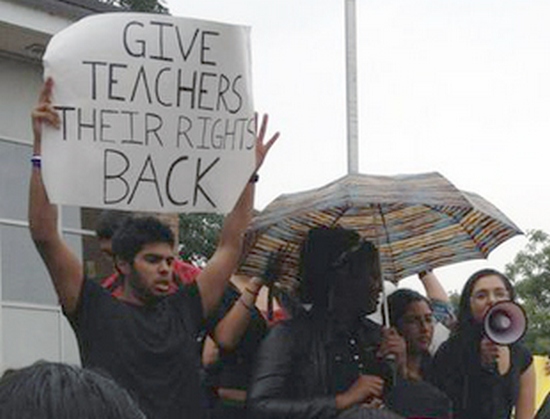
Students rally with
teachers in Vaughan,
September 14, 2012.
|
"We believe that teachers are the victims of what the
government did
and what Dalton McGuinty did," a student from Toronto said. "They're
taking the rights of our teachers away... Through fighting for them,
hopefully we get what we want."
Another said students were protesting to kill Bill 115
and standing
up for their teachers' rights since the teachers cannot. A 15 year-old
student said: "The teachers can't talk about it, which is stupid
because we can't get information."
Students in Fenelon Falls and Lindsay held a walk out on
September
13. One student told reporters: "The province makes a big deal about
being healthy, like taking the [junk food] vending machines out of the
schools, and now we could lose our sports and clubs. It doesn't make
sense."
Another said he was protesting "to show the teachers
that we care
about them and want their rights back, adding he didn't think it was
fair that teachers had no choice in accepting the new contract.
A member of the student council said, "Our teachers
support us, and
we're showing we support them. We're doing this to change the public's
perception of teachers." He added that most people don't understand how
much time teachers devote to the kids behind the scenes. "They do it
because they care about
us. The government is taking away their democratic rights."
Another student said the teachers coach, help with
fundraisers and
give after school academic help because they want to see the students
succeed. "Their contracts don't say they have to stay; they do it for
us."
Students at a number of Northern Ontario high schools
held protests
on September 13. In Thunder Bay students at one school walked out of
class and waved signs in support of their teachers in front of the
school, calling on passersby to honk in support.
In Manitouwadge, the entire student body left their
classes and
walked from the local high school through town and back. The next day
the students organized a noon-hour discussion on issues related to the
legislation and why it was important to show solidarity with their
teachers.
"We wanted to raise awareness of the attack on teachers'
rights to
strike and work-to-rule in the negotiation process" one of the students
told a local reporter, adding that students wanted to let everybody
know they support the teachers and were not happy about their rights
being taken away.
Ottawa high school students walked out of class
September 14 to join
teachers and education workers protesting in front of Premier Dalton
McGuinty's constituency office.
Students at schools in Prince Edward County in Eastern
Ontario held
a class walk-out on September 17 to show support for their teachers,
support staff, and student rights. In the lead up to the action
organizers discussed on social media the significance of their action.
"Our goal is to create awareness for the current civil
rights battle
revolving around the teachers' unions and the government of Ontario,
specifically the effect it will have on students and the public
sector," wrote one of the organizers. "We aim to uphold the civil
rights of all Canadians, by doing what teachers
cannot right now: take a stand by striking."

Bramalea students
hold walkout in support of teachers, September 17, 2012.
|
Another wrote: "So let me get this straight. By removing
the
teacher's right to strike and freezing their salaries, the government
is putting us first? Those who help us develop the skills we need to
function in this world deserve proper compensation for their work, and
removing their right to strike is beyond ridiculous...
Europe proved that austerity doesn't work, so why the hell are we still
doing this? When something doesn't work, you find a better way. As
Einstein said: 'Insanity is doing the same thing, over and over again,
but expecting different results.'"
Students at Bramalea Secondary School in Brampton also
walked out of
classes on September 17 to protest their extracurricular activities
being cut and denounce the provincial government for taking away
teachers' rights. Signs they carried included ones that said "Bill 115:
Putting Students Last Act" and "We
support our teachers, not our government." Walkouts are planned at
other schools later in the week and organizers said there would be a
broader student rally on Saturday, September 22 at Queen's Park from
noon to 1:30 pm.

Discussion on Putting Students First
Act
Letter to the Editor
McGuinty's Attack on Matters of Conscience
Whether or not teachers withdraw voluntary work is a
personal
decision which is described as a matter of conscience. In fact, it is
an assault on their conscience to have to take such a decision.
Teachers, like nurses, doctors and many others, are professionals. As
such they take on a duty to fulfil the aim of their
profession -- teaching their students to make sure they acquire the
knowledge society imparts commensurate to their grade level so that
the younger generation is prepared to take society forward.
To say the decision to carry out services for which they
are not
paid is a personal one is an assault on their conscience when they are
deprived of the conditions they require to fulfil the aim of their
profession. The work they contribute is crucial to the lives of their
students, the parents and the society as a whole.
To make this a matter of personal conscience would be like saying that
when the government does not provide enough doctors and demands that a
few work around the clock, a doctor who refuses to work under such
conditions is responsible for the death of a patient. Working under
impossible conditions is made a matter of her/his conscience by
implying that the refusal to work under untenable conditions is a
violation of the Hippocratic Oath.
The point is that people can only do their duty if the conditions are
there for it. Governments are duty-bound to make sure the conditions
are there for teachers and students alike to teach and learn and
flourish. This is why, so long as the government refuses to respect
their profession, teachers are justified in withdrawing their voluntary
services.
- A parent in Toronto

McGuinty's Arrogance About
Violating Charter of Rights
- Jim Nugent -
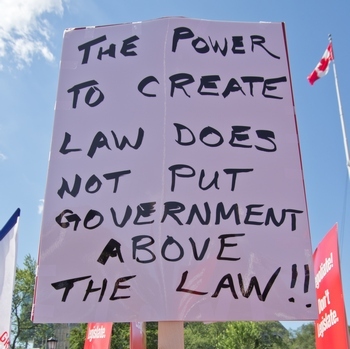 The McGuinty government's
flagrant violation of the rights of
teachers and educational workers with its unjust and unnecessary Bill
115 has been denounced as illegal and unconstitutional by many people
both inside and outside the Ontario Legislature. As one front in their
resistance to the attack on them, teachers and education workers have
taken up a legal challenge of Bill 115 under the Charter of Rights
and Freedoms
(the Charter) and are prepared to challenge the law through the courts
up to the Supreme Court. McGuinty though is strutting arrogantly in the
Legislature expressing confidence that the courts, including the
Supreme Court, will declare his unjust,
unpopular attack on workers' rights is within the law. The McGuinty government's
flagrant violation of the rights of
teachers and educational workers with its unjust and unnecessary Bill
115 has been denounced as illegal and unconstitutional by many people
both inside and outside the Ontario Legislature. As one front in their
resistance to the attack on them, teachers and education workers have
taken up a legal challenge of Bill 115 under the Charter of Rights
and Freedoms
(the Charter) and are prepared to challenge the law through the courts
up to the Supreme Court. McGuinty though is strutting arrogantly in the
Legislature expressing confidence that the courts, including the
Supreme Court, will declare his unjust,
unpopular attack on workers' rights is within the law.
The Supreme Court has ruled
that the
freedom of association guaranteed by Section 2(d) of the Charter
includes workers' right
to form unions, to collective bargaining and to go on strike. So why is
McGuinty so self-assured about the Supreme Court backing up his attack
on teachers and educational workers?
McGuinty's swagger comes from his knowledge that, while
the courts
have made a clear declaration that workers' collective rights are
guaranteed by the Charter,[1] in
practical terms there are gaping loopholes. McGuinty calculates
that the Charter
and its interpretation by the Supreme Court make two strategies
available to his government for the trampling of workers' rights. This
means that those who undertake the Charter challenges have to keep in
mind not falling into thess traps.
Fraudulent Collective Bargaining Process
The first
strategy is to pretend that no violation of workers' rights occurred, a
charade the Supreme Court has shown it is happy to go along with.
McGuinty's lawyers will argue that the government engaged teachers and
education workers in a meaningful collective bargaining process
respectful of their rights. The need to fabricate evidence for this
argument lies behind the negotiation farce the government has been
playing out at the Provincial Bargaining Table since January.
 Toward this end, the
provincial "negotiation" team was headed by the
infamous anti-worker legal henchman Judge James Farley.[2]
They refused
to negotiate with teachers and education workers' union representatives
even when the unions accepted the government's main demand for a
two-year wage freeze. Farley and other lawyers were just
going through the motions to prepare for the eventual introduction of
Bill 115 and a Charter challenge of it. Toward this end, the
provincial "negotiation" team was headed by the
infamous anti-worker legal henchman Judge James Farley.[2]
They refused
to negotiate with teachers and education workers' union representatives
even when the unions accepted the government's main demand for a
two-year wage freeze. Farley and other lawyers were just
going through the motions to prepare for the eventual introduction of
Bill 115 and a Charter challenge of it.
This strategy for gaming the Charter is what McGuinty
was talking
about when he told the Legislature, "The Supreme Court of Canada has
set out some basic rules that you have to follow to ensure that
ultimately we can hit the pause button on public sector pay. So we
started back in January..." The McGuinty government is applying to
teachers and education workers the experience with this strategy it
gained during its involvement in the Supreme Court's 2008 Fraser
decision.
The Fraser decision validated the Agricultural
Employees Protection Act 2002
a piece of Harris Conservative legislation that assigned second class
worker rights to farm workers. This law is a cruel hoax on migrant farm
workers which allows them to form associations but not to bargain
collectively with employers. When this law
was ruled unconstitutional by a lower court, the McGuinty government
appealed to the Supreme Court to have it upheld. To its eternal shame,
the Supreme Court blessed this cynical McGuinty-Harris mockery of
workers' rights as legitimate and constitutional.
In the courts McGuinty is expecting a similar outcome to
the Charter
challenge of the teachers and education workers as in the Fraser
decision. He is expecting that the Supreme Court will find that the
dictate, blackmail and stonewalling of the government
lawyer/negotiators at the Provincial Bargaining Table will be ruled to
be a legitimate
collective bargaining process that respects the workers' rights
provisions in the Charter.
Reasonable Limits to Rights
Information about
McGuinty's second strategy was blurted out by Minister of Education
Laurel Broten in the Legislature when an opposition member was speaking
against Bill 115. Broten heckled the speaker with shouts of "Reasonable
limits! Reasonable limits!" What Broten was referring to is the
Charter's Section 1 which says: "The Canadian Charter of Rights
and Freedoms
guarantees the rights and freedoms set out in it subject only to such
reasonable limits prescribed by law as can be demonstrably justified in
a free and democratic society."
This is the Charter's
"reasonable limits" clause. It is one of the
provisions in the Charter that provides constitutional means for
governments to suppress the exercise of any rights recognized by the
Charter. The freedoms the Charter gives in Section 2 are taken away in
Section 1. "Reasonable limits" is an escape clause for government built
into
the Charter.[3]
 If McGuinty's government
was unsuccessful in presenting
the
fraudulent Provincial Bargaining Table negotiations as a legitimate
collective bargaining process, then the reasonable limits clause would
kick in. If the teachers and education workers were able to show in
court that Bill 115 violates their fundamental democratic rights, the
courts
would then provide the government with an opportunity to demonstrate
that this violation was a reasonable limitation on workers' rights. If McGuinty's government
was unsuccessful in presenting
the
fraudulent Provincial Bargaining Table negotiations as a legitimate
collective bargaining process, then the reasonable limits clause would
kick in. If the teachers and education workers were able to show in
court that Bill 115 violates their fundamental democratic rights, the
courts
would then provide the government with an opportunity to demonstrate
that this violation was a reasonable limitation on workers' rights.
The courts have set out criteria for determining
reasonableness of
limits on rights, known as the Oakes Test.[4]
The prime element in this
test is that the legislation or action of a government limiting rights,
is seeking an "objective of sufficient importance to warrant overriding
a right or freedom."
What constitutes an "objective of sufficient importance"
of course
could mean anything. It is a political decision to be made by judges.
The judges' decision is informed by their class position in society,
the class struggle taking place in society and by the judges' roles as
pillars of the existing political arrangements in which a rich,
privileged
minority rules over the majority.
What this political decision about limiting rights is
not informed
by is the thinking of workers and the working class outlook. The court
decision on migrant workers' rights demonstrates this. There is hardly
a worker in the country who would agree with the grandees of the
Supreme Court that hardworking and vulnerable migrant farm workers
should have only second class workers' rights. It is this lack of
working class influence over the political decisions of the courts that
McGuinty will be relying on when he faces the teachers' and education
workers' Charter challenge.
Their lack of influence over decision-making is a
problem for
workers in the courts and protection of rights as it is in every area
of political and economic affairs of the country. Working class
influence and leadership is required for renewal of all the
institutions of society, so rights and freedoms aren't empty
declarations, so self-serving
politicians like McGuinty can't trample on rights with impunity and so
the rights of all are defended.
Notes
1. Judge D.P. Ball at the Court
of Queen's Bench for Saskatchewan in
February, 2012 made a ruling on the Saskatchewan government's Public
Service
Essential
Services
Act. The ruling provides an up-to-date
summary of what the courts now say about workers' rights:
"...the Supreme Court of Canada has treated
associational activity
by employees for the purpose of achieving collective bargaining goals
(as distinct from political, social or other goals), including the
rights to organize, to bargain collectively and to strike, as part of
freedom of association guaranteed by s. 2(d) of the Charter." The
court's
description of workers' rights is completely detached from the reality
of the courts allowing governments to attack workers' collective rights
with impunity.
2. Judge James Farley is
infamous among workers in Ontario for his
anti-worker rulings. Steelworkers Local 1005 battled Farley when he
presided over the bankruptcy fraud of Stelco and its handover to US
Steel. Farley also had an important role in the landmark anti-worker
Fraser decision by the Supreme Court.
It was Farley who made the original ruling
against migrant farm workers on their Charter challenge of the Harris
government's Agricultural Employees Protection Act 2002
by declaring it constitutionally valid. The Appeal Court reversed
Farley's decision. When the McGuinty government took the Appeal Court
decision to the
Supreme Court, the Supreme Court's shameful Fraser decision was a
reinstatement of Farley's original decision. It is no accident that
Farley showed up at the Provincial Bargaining Table as head legal
henchman in McGuinty's negotiations fraud.
3. Section 33 of the Charter is
another more powerful clause for
governments to negate rights, the "notwithstanding clause." This
section gives the federal parliament and the provincial legislatures
the power to declare rights under Sections 2, 7 and 15 inoperable with
regard to a specific piece of legislation. When a reporter asked
McGuinty if
he would use Section 33 against the teachers and education workers, he
refused to comment.
4. If a plaintiff has proven to
a court that legislation violates
Charter rights, the government responsible for the legislation must
prove that the limitation of rights is reasonable. These conditions are
known as the Oakes Test or the proportionality test. In an article
published in the Ottawa Law Review, Gerald Beaudoin, a former
University of
Ottawa law professor and former Conservative Senator, outlines
conditions legislation has to pass in the Oakes Test:
- an objective of sufficient importance to
warrant overriding a right or freedom exists
- the concerns of the government responsible for the legislation are
urgent and real
- the means used to achieve that objective are reasonable (that is, the
measures are not arbitrary, inequitable or irrational)
- the means used impair the rights and freedoms of the individual as
little as possible
- there is proportionality between the effects of the measures
implemented and the objective that has been identified as of sufficient
importance.
Beaudoin admits that at the end of the day, what
is reasonable is really a political decision by a judge:
"This test, even though it is exacting, is not
fixed or rigid.
Section 1 confers on judges a power to assess competing interests and
authorizes them to make value judgments."

In the Legislature
Hands Off Public Sector Workers!
- Rob Woodhouse -
 Toronto Day of Action
Against Cuts, April 9, 2011.
Toronto Day of Action
Against Cuts, April 9, 2011.
As teachers and education workers step up their
organizing to defend their rights, other workers across Ontario's broad
public sector are also preparing to confront the neo-liberal offensive
being led by he McGuinty Liberals and the Hudak Conservatives.
Immediately after the rejection of his party by the
voters in the Kitchener-Waterloo by-election McGuinty indicated he
would
disregard this popular expression against his attacks on workers'
rights. McGuinty told the media his government would push through the
legislation against teachers and education workers.
He also said he would bring in legislation against other public sector
workers in the fall. McGuinty's minority government will count on the
Hudak Conservatives for support.
 Several large units of
public sector workers are
preparing for this confrontation. The 30,000 members of the Ontario
Public Service (OPS) unit of the Ontario Public Service Employees Union
(OPSEU) have a contract that expires on December 31. Health care
workers number more than 200,000 in Ontario. Most are
in the public sector with contracts that are expiring or have already
expired. Several large units of
public sector workers are
preparing for this confrontation. The 30,000 members of the Ontario
Public Service (OPS) unit of the Ontario Public Service Employees Union
(OPSEU) have a contract that expires on December 31. Health care
workers number more than 200,000 in Ontario. Most are
in the public sector with contracts that are expiring or have already
expired.
In their current round of negotiations, health care
workers expect to be targeted by the McGuinty government in much the
same way as teachers and educational workers have been. Some units of
health care workers are already under a wage freeze. The government has
said it intends to freeze wages across the
board in the sector. As well, health care workers point out, overall
spending restraint by the government in the health sector means the
wage freeze will be accompanied by employers demanding other
concessions. Several large units are in negotiations or preparing for
them and are gearing up for a fight.
One of these is the 60,000 members of the Canadian Union
of Public Employees (CUPE) in health care. These workers from
hundreds of locals are organized in bargaining groups under the
umbrella of the Health Care Workers' Coordinating Committee (HCWCC).
Thirty thousand HCWCC workers are in hospitals
and 20,000 are in long-term care homes. Many of these workers are
entering the last year of a four-year contract and are preparing for
central bargaining to begin in March.
A large unit of health care
workers is already in
negotiations. The 16,000 members of Service Employees International
Union (SEIU) working in nursing homes began bargaining in mid-August.
In a SEIU press release, bargaining committee members reported that the
employers were refusing wage increases
and negotiations on other issues were difficult. Unresolved wage issues
were scheduled for arbitration on September 13-14.
Many health care workers are classified as essential
workers and are prohibited from exercising their right to
strike. Thus, most health care sector contract disputes are settled
through a
system of interest arbitration. This presents another problem for
McGuinty in imposing his public sector wage freeze since
this would require the overthrow the interest arbitrations system.
McGuinty is already working on this issue by trying to
connect interest arbitration to the relatively high salaries of police
officers and fire fighters. In fact, some of the lowest paid workers in
the province are health care workers classified as essential workers in
nursing homes and home care.
Conservative leader Tim Hudak is tag-teaming with
McGuinty on interest arbitration with his calls for radical
reorientation of the arbitration system. Upsetting the equilibrium of
the arbitration system will bring thousands more public sector workers
into the confrontation with the anti-worker offensive led by
McGuinty and Hudak.

More McGuinty-Hudak Collusion to
Attack Public Sector Workers
- Dan Cerri -
More collusion is taking place in the Legislature
between the
McGuinty Liberal government and the opposition Hudak Progressive
Conservatives to unleash further attacks, this time on public sector
workers. The
tone set in the first three weeks of the fall session of the
Legislature continues to be one of contention between the
governing Liberals and opposition Progressive Conservatives that is in
fact part of a joint plan to implement more austerity. Their
self-serving discussions continue making deficit financing the agenda
so that all workers and people in Ontario will be forced to pay the
rich through wage freezes and other attacks on
their livelihoods and rights.
On September 13, opposition leader Tim Hudak said:
"We found out that the deficit between 2010-11 went from
$14 billion
to $13 billion, in public accounts. That's only $1 billion. Surely it's
not going to take us 15 more years to get back in balance. That's not
progress. That's digging the hole even deeper."
In response, Education Minister Laurel Broten said:
 "Certainly, on a day where
public accounts is released
-- and we make
it very clear that the deficit for 2011-12 is $13 billion. It is $3.3
billion ahead of the 2011 budget projections, 47% lower than forecast
in 2009. At the same time, program spending growth was held below 1%,
lower again than the 2011 budget
target. We've been able to accomplish that, despite challenging fiscal
times because we have made difficult choices. One of those choices,
which we believe is fair and responsible, is to freeze public sector
wages, and that is allowing us to ensure that we create jobs and grow
the economy." "Certainly, on a day where
public accounts is released
-- and we make
it very clear that the deficit for 2011-12 is $13 billion. It is $3.3
billion ahead of the 2011 budget projections, 47% lower than forecast
in 2009. At the same time, program spending growth was held below 1%,
lower again than the 2011 budget
target. We've been able to accomplish that, despite challenging fiscal
times because we have made difficult choices. One of those choices,
which we believe is fair and responsible, is to freeze public sector
wages, and that is allowing us to ensure that we create jobs and grow
the economy."
The day before on September 12, the Premier himself said
as much
when NDP Leader Andrea Horwath asked McGuinty if more legislation
against public sector workers would be implemented. McGuinty responded
in his infamous patronizing way to dismiss the question while clearly
suggesting that in fact
this would take place:
"I appreciate my honourable colleague's interest in the
next
initiative we'd like to move ahead with, but I would encourage her to
wait for the details before she attacks it. That will allow her to come
to understand exactly what we want to do and how we want to do it. But
I can say at the highest level that, in
keeping with the pronouncements that we made in our budget some six
months ago, we think it's important to understand that we're all in
this together. I speak to the broader public sector, all of us who have
the privilege of working for Ontarians through the public sector, and
we all have to find a way to be part
of the solution. We want to do that in a way that is respectful of our
collective agreements and the collective bargaining process, but we
also want to be respectful of the taxpayers and their demands of us
that we find a way to continue to protect health care and education as
priority services."
Also noteworthy is the Progressive Conservatives' return
to their
2011 election "promise" to revamp a "broken" arbitration system. The
Progressive Conservatives have introduced Bill 121, the Ability to
Pay Act, 2012, an Act to deal with arbitration in the public
sector. It amends or repeals more than
one Act and has already passed first reading. A Toronto Star
report indicates that the legislation, introduced by Simcoe-Grey MPP
Jim Wilson, will be debated October 4 and in part would force
arbitrators to consider whether an employer, such as a municipality,
can afford a settlement. The Liberals have
confirmed their intention of revamping the arbitration system which
they tabled in the budget but the Progressive Conservatives felt it did
not go far enough. (Read more about Hudak's scheme to "fix the broken
arbitration system" in Ontario
Political Forum, September 26,
2011 - No. 1.) Ontario
Political Forum will continue to report on this legislation.

An Injury to One is an Injury to All! All
for One and One for All!
Migrant Farm Worker Killed in Belleville Orchard
On September 10 a farm worker was killed on the job
while working in
an orchard operation near Belleville, Ontario. Fausto Martinez-Izazaga,
38, died when an industrial water tank at the agriculture complex fell
and crushed him. Fausto was a Mexican national working in Canada as a
farm worker under the
Seasonal Agricultural Workers Program. Thirteen migrant farm workers
have died on the job in Ontario this year.
 The United Food and
Commercial Workers union (UFCW)
which has
established defence and support organizations for migrant farm workers
across Canada issued a press release regarding the death of Fausto
Martinez-Izazaga . UFCW condemned the Ontario and Canadian government
for their failure to ensure
safe and healthy working conditions for migrant farm workers: "It has
been a devastating year in Ontario. We are saddened by this terrible
news and deeply concerned that another worker in Ontario agriculture
has been killed. We have seen casualty rates continue to climb with
little or no response from the federal
or Ontario governments. The United Food and
Commercial Workers union (UFCW)
which has
established defence and support organizations for migrant farm workers
across Canada issued a press release regarding the death of Fausto
Martinez-Izazaga . UFCW condemned the Ontario and Canadian government
for their failure to ensure
safe and healthy working conditions for migrant farm workers: "It has
been a devastating year in Ontario. We are saddened by this terrible
news and deeply concerned that another worker in Ontario agriculture
has been killed. We have seen casualty rates continue to climb with
little or no response from the federal
or Ontario governments.
"Safety enforcement as well as educational programs
specific to the
needs of the workers and the industry have failed to materialize. The
number of workers not returning to their families will continue to grow
if the rights and the risks to agriculture workers in Ontario continue
to be ignored,"
Ontario Political Forum extends heartfelt
condolences to
the family, friends and co-workers of Fausto. We join UFCW in
condemning the Ontario and Canadian government for continuing to allow
the workplace deaths of migrant workers on Ontario farms.

Take Back the Night!
Toronto Women Hold Spirited Rally and March
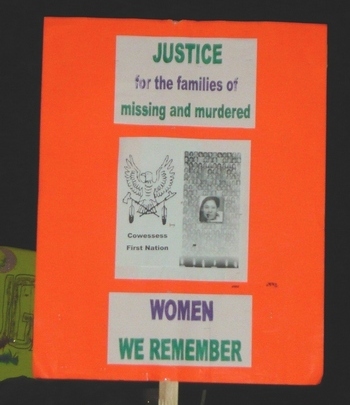 More than a thousand women
took part in a spirited Take
Back the Night rally and march in Toronto on September 15. Take Back
the Night! has been organized annually in Toronto
since 1980 as part of
the work to end violence against women. The vast majority of those
participating in this year's event were
young women, some of them high school youth. They filled the streets
with their chants: "Yes Means Yes, No Means No!"; "However We Dress,
Wherever We Go, Women, Unite Take Back the Night -- Stop Rape Now!";
"Whose Streets? Our Streets!"; "Whose Bodies? Our Bodies!" and many
more.
The march was warmly received by residents of the Parkdale
neighbourhood where it
took place, who came out onto the streets, or waved from their
balconies. More than a thousand women
took part in a spirited Take
Back the Night rally and march in Toronto on September 15. Take Back
the Night! has been organized annually in Toronto
since 1980 as part of
the work to end violence against women. The vast majority of those
participating in this year's event were
young women, some of them high school youth. They filled the streets
with their chants: "Yes Means Yes, No Means No!"; "However We Dress,
Wherever We Go, Women, Unite Take Back the Night -- Stop Rape Now!";
"Whose Streets? Our Streets!"; "Whose Bodies? Our Bodies!" and many
more.
The march was warmly received by residents of the Parkdale
neighbourhood where it
took place, who came out onto the streets, or waved from their
balconies.
Each year the march is
organized by the Toronto Rape
Crisis Centre/Multi-cultural Women Against Rape working
with women and their organizations in a particular neighbourhood and a
theme is chosen which relates to the organizing work women are
doing there. This year's theme was
"Un-occupying our minds -- healing ourselves." At the rally prior to
the
march, organizers explained the theme's significance. They pointed
out that many women who are diagnosed as having mental illnesses are
victims of violence. They have a
right to speak about their
experiences and sort out what they need to heal themselves. They have a
right
not to be medicalized or psychiatrized. The diagnosis of mental illness
is used to stigmatize them and dis-empower them, the speakers said.
A number of the women who spoke pointed out that while
social programs such as peer-based counselling and treatment are being
de-funded and many programs have been shut down, money is still being
poured into paying for drugs and psychiatrists. This is not about lack
of funds but about social control and criminalizing the poor by
incarcerating them in mental institutions speakers said. Some speakers
addressed the dangerous effects of electro-shock treatments and
anti-psychotic drugs. A theatre group active in defending the rights of
those who have been psychiatrized spoke of the history of those in
mental hospitals.
Many other speakers and cultural performers participated
in the rally and brought to the fore women's experiences with violence
and how they are organizing to change the situation.
 
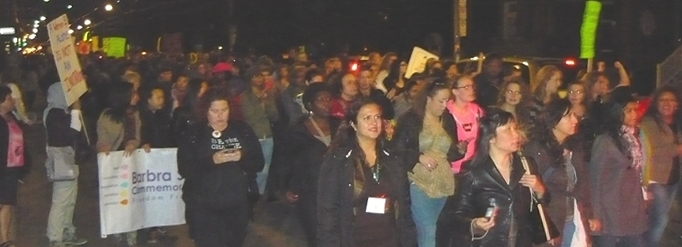

PREVIOUS
ISSUES | HOME
Read Ontario Political Forum
Website: www.cpcml.ca
Email: ontario@cpcml.ca
|

